Alaska's elections are now an even bigger mess than they usually are due to the adoption of ranked-choice voting codified by Proposition 2. I wager few will be able to figure out how to vote in upcoming elections. And if they do, even fewer will trust the outcome. Apparently, Alaska hasn't gotten the memo because elections are not supposed to be confusing. It all started in 2019 and ended with the people's approval of Proposition 2 in the November 2020 election with a narrow margin.
In a state where the June special primary election was a jungle primary, signature verification isn't codified, and voter rolls are notoriously dirty; this is the last thing Alaskans need. Notably, a Judicial Watch investigation shows that Alaska enjoys the fine status of being one of eight states "showing statewide voter registration rates exceeding 100 percent." There are allegedly 1.8 million extra registered voters nationwide.
Proposition 2 Violates Alaska Constitution
First of all, Proposition 2 (or the Fair Representation Act) violates Alaska's Constitution because it was bundled with another initiative to address "dark money" in elections. Alaska's Constitution stipulates that bills should address one issue at a time. Voters can then vote on measures separately, which is an obvious advantage if integrity is the goal.
As Section 13 explains, such separation helps to "safeguard the integrity of the legislative process."
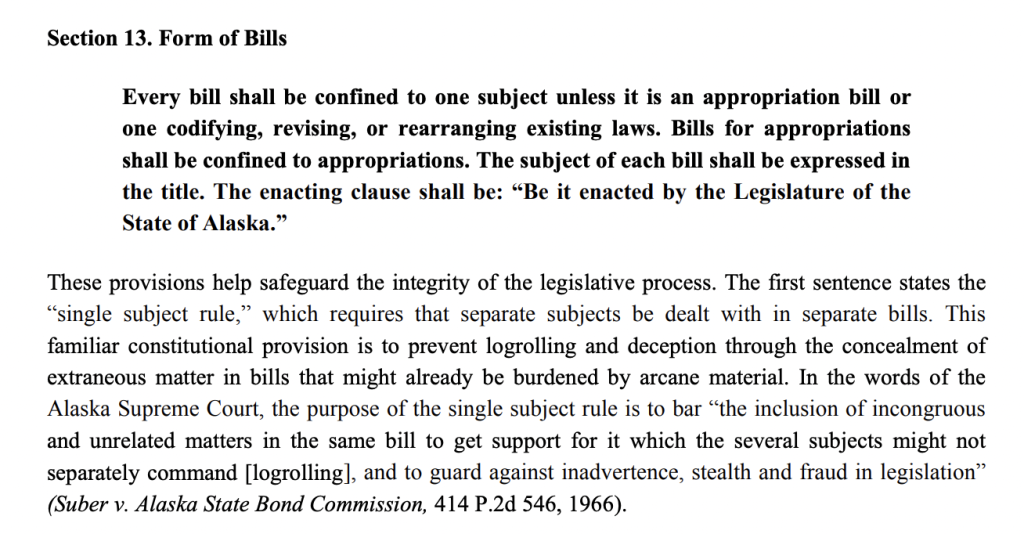 Alaska Constitution/Article ll, Section 13
Alaska Constitution/Article ll, Section 13
In fact, Lieutenant Governor Kevin Meyer correctly denied certification of the initiative on August 30, 2019, because it violated Article ll, Section 13 of the Alaska Constitution.
 Lt. Gov. Kevin Meyer denies certification of initiative/August 30, 2019
Lt. Gov. Kevin Meyer denies certification of initiative/August 30, 2019
Meyer's denial was affirmed by Attorney General Kevin Clarkson, where he explained why voters are robbed of "their voices" when multiple policy choices are bundled.
 Attorney General Kevin G. Clarkson/Alaska Prop 2
Attorney General Kevin G. Clarkson/Alaska Prop 2
As a result of the controversy, lawsuits ensued. In the end, Alaska's Supreme Court upheld earlier rulings by affirming Proposition 2 on January 19, 2022.
A reader contacted UncoverDC's Editor-in-Chief, Tracy Beanz, to address the mess in Alaska. We then contacted her to talk about what Alaskans are thinking concerning elections in their state. Her husband, a fourth-generation Alaskan, wrote this about the Supreme Court decision:
"The initiative made it through judicial review on the strength of past precedent set by the Alaska Supreme Court that broadened the boundaries of what could be considered as one subject so much that any legislative bill or citizen initiative with even the most tenuous and high-level connection can now survive judicial review."
He then added he believes what happened in Alaska is a contagion that is spreading throughout the judicial system in America. Courts are now in the business of interpreting federal and state constitutions assigning intentions or interpretations that are not "explicitly written in, understood or agreed to" by the people. Such jurisprudence lends itself handily to overly-politicized interpretations of the Constitution by more liberal jurists. Such decisions provide important precedents for future cases because that is essentially how the law works.
What is Ranked Choice Voting?
The following video explains ranked choice voting briefly and easily enough. However, be forewarned that while many will say it is the most democratic way to vote, others will argue it is a disaster.
The Heritage Foundation writes that ranked-choice voting:
- Is a scheme to disconnect elections from issues and allow candidates with marginal support from voters to win.
- It obscures true debates and issue-driven dialogs among candidates and eliminates genuine binary choices between two top-tier candidates.
- It also disenfranchises voters because ballots that do not include the two ultimate finalists are cast aside to manufacture a faux majority for the winner.
Ultimately, naysayers of ranked-choice voting believe algorithmic nonsense similar to what we saw in the 2020 election could essentially be manipulated to produce a desired outcome in an election. Even Gov. Jerry Brown in California vetoed a bill to expand ranked-choice voting in 2016. Brown stated:
"In a time when we want to encourage more voter participation, we need to keep voting simple. Ranked-choice voting is overly complicated and confusing. I believe it deprives voters of genuinely informed choice."
Whether one believes it to be an opportunity to manipulate the vote or not, it is complicated and confusing to voters. Our reader confirmed that she has yet to meet anyone who truly wants or understands how ranked-choice voting works. Alaska's narrow margin of approval, at a minimum, seems to confirm only marginal interest in the shift to ranked-choice voting. Many in the state now believe it was dishonestly passed.
The Mess in Alaska
The special primary election on June 11 was the first-ever statewide mail-in election. It was also a jungle primary—"meaning all candidates will run in the same primary regardless of party affiliation." Voters selected only one candidate, not their top four, as would be the case for ranked-choice voting.
It was a special election because Congressman Don Young died, leaving his seat vacant until January 2023. Forty-eight candidates appeared on the ballot on June 11. Welcome to the jungle.
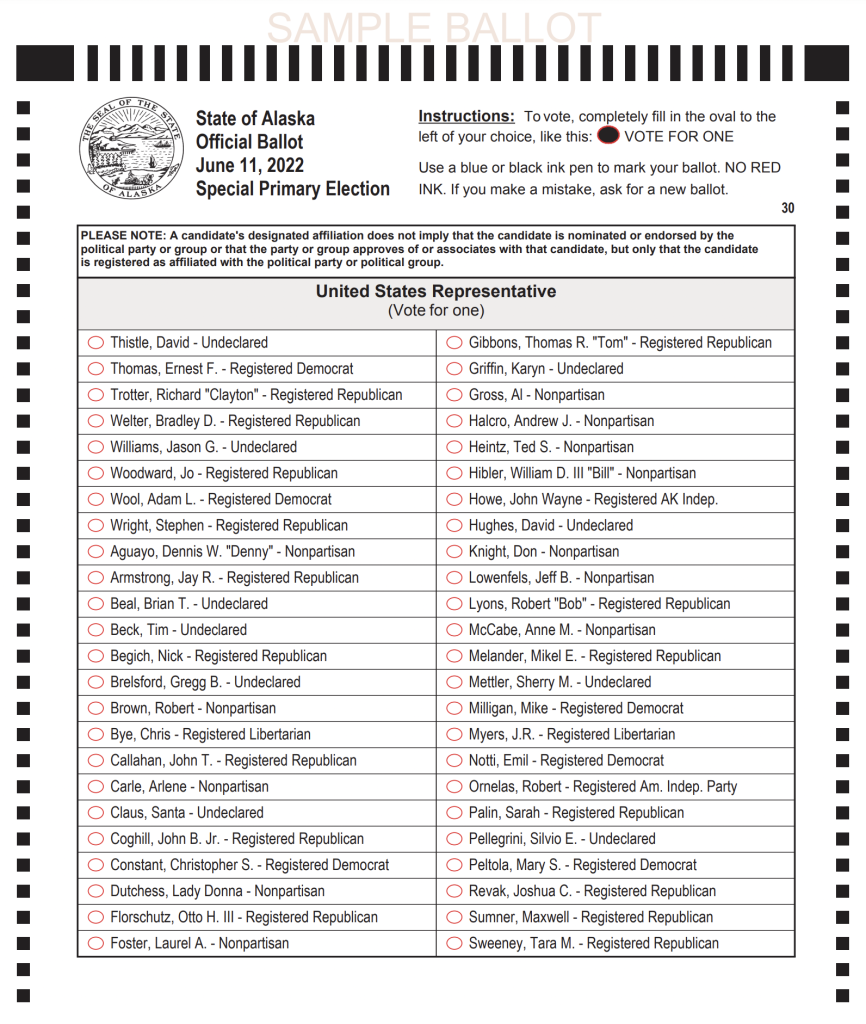 Alaska/June 11 Special Primary Sample Ballot
Alaska/June 11 Special Primary Sample Ballot
The Alaskawatchman captures the mayhem in its March 25 column entitled "Bedlam Reigns In Alaska's Lunatic Asylum" by Bob Bird. Our reader confirmed the sentiment contained therein. Bird questions the mail-in vote and the entire process detailed here while pointing out several of the landmines Alaskan voters faced in the June 11 special jungle primary.
"Catch that: I want to know why we can't show up at a polling place. Who believes the COVID Capers anymore? Are to trust the malefactions of the infamous Dominion voting machines, which will, in this instance, only determine who are the Top Four winners.
I wonder, how many names will appear? It will truly be a jungle primary. I know people who are running for statewide federal office who have lived in Alaska less than a year. Will there be ten? Fifty? Hundreds? Will the names be alphabetized or randomly juggled in lots? Will you be able to find your ONE choice? Will people spoil their ballots by mistakenly writing down their rankings inside the little black-out circle anyway?"
The August 16 Election is a Two-fer
Technically, three candidates moved on to the August 16 special general election ballot. An independent candidate, Al Gross, withdrew. The withdrawal came in too late to replace him for the August 16 vote. The four candidates to originally move on were Alaska's former Governor Sarah Palin, "Republican businessman Nick Begich III, independent orthopedic surgeon Al Gross and Democratic former state Rep. Mary Peltola." Palin "finished" relatively strongly with 27.01 percent of the vote if you dive into the final tally.
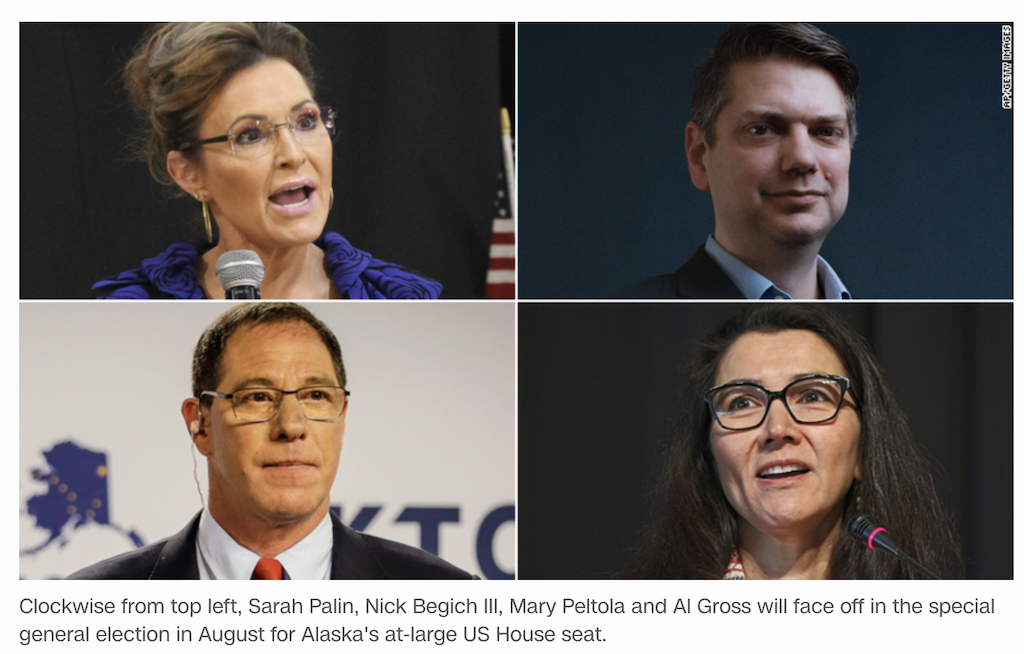 AP Photo/https://www.cnn.com/2022/06/16/politics/palin-begich-gross-peltola-alaska-election/index.html
AP Photo/https://www.cnn.com/2022/06/16/politics/palin-begich-gross-peltola-alaska-election/index.html
With Gross's withdrawal, three candidates will also be running in both elections on the August ballot. The first section of the August ballot is a "pick one" race. If you notice, all three of the June 11 winners are there. This is designated as the "Regular Primary Election." The one who is picked there will go on to the November General Election, which will also be a ranked choice vote. To be crystal clear, the November General Election will determine with a ranked choice vote who takes the seat permanently with the "pick one choices" from August 16.
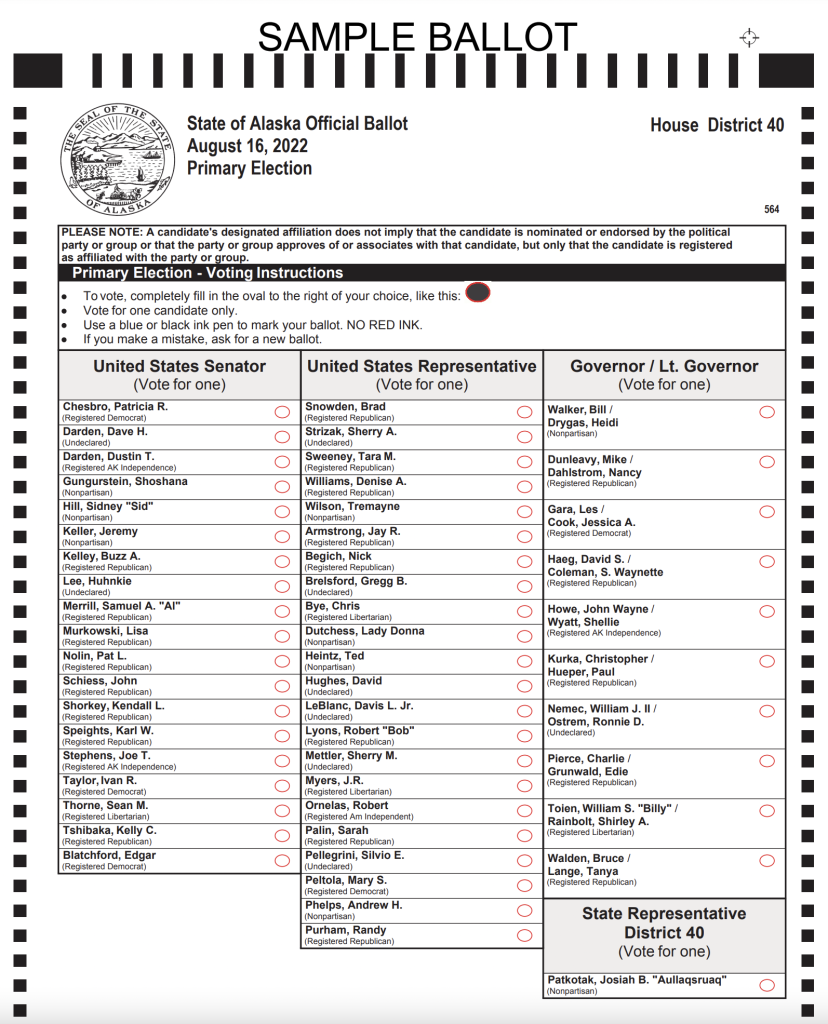 August 16 ballot/Alaska/Pick One
August 16 ballot/Alaska/Pick One
The same ballot reflects what is called a Special General Election. Therefore, the ballot also has a section for the three who advanced to fill Young's seat through January. It will be a Ranked Choice Vote, not a "pick one."
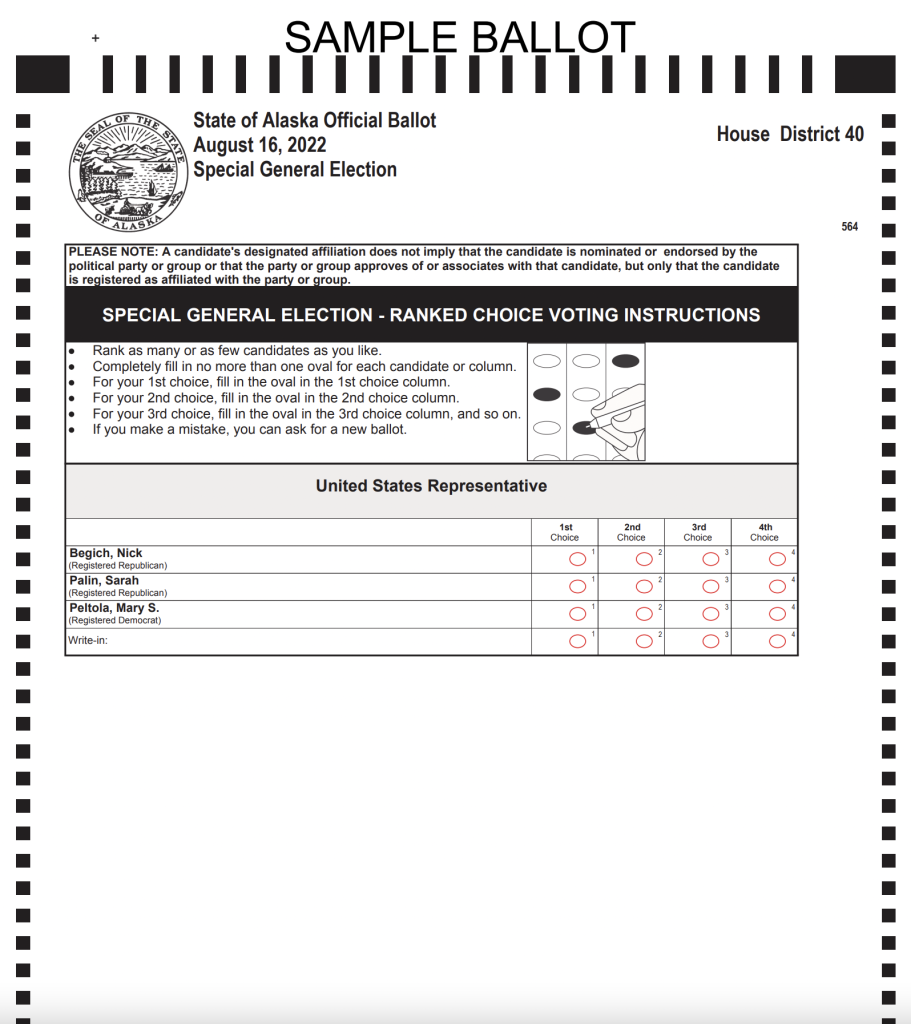 August 16 RCV Section/Alaska
August 16 RCV Section/Alaska
Real World Potential Outcomes with Ranked-Choice Voting
The Washington Post lays out one of many scenarios associated with ranked-choice voting for a "polarizing candidate" like Sarah Palin. The scenario clarifies why ranked-choice voting can produce unintended results for many voters in November's ranked-choice vote election. They cite polling from longtime Alaskan pollster Ivan Moore.
His firm found that Palin was a "top choice in the pick one primary," but "she lost to Begich in the general" because of second and third rankings by voters. He also said, "the two Republicans could be neck-in-neck in a ranked-choice vote election, and Peltola could be a contender with a newfound ability to consolidate first-place votes and financial support from the left."
Moore theorized that ranked-choice voting might not favor Palin because she is polarizing. Rather it would "favor candidates who have strengths across the ideological spectrum." Moore went on to say:
"If she is to become Alaska's next U.S. House member, Palin will probably need support from those who ranked one of her competitors first, some observers said. Under the new voting system, if a candidate gets a majority of first-choice votes, they win. If not, the last-place finisher is eliminated, and each of their ballots is recast toward the voter's next choice. That process is repeated until one candidate has a majority.


